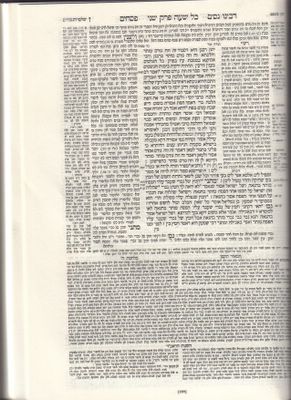
HIDE/SHOW IMAGE
7a
{Pesachim 26b continues}
it must be cooled is the Sages, who hold that when this and that cause, it is permitted.
And the halacha is that when this and that cause, it is permitted, like the Sages.
And so do we conclude in masechet Avodah Zarah {49a}, in perek Kol haTzelamim, in the matter of planting underneath it vegetables in the rainy season, that Rabbi Yossi held that when this and that cause, it is permitted, and Rav Yehuda cited Shmuel that the halacha is like Rabbi Yossi.
And we say there: there was a certain garden that was fertilized with fertilizer of idolatry. Rav Amram sent {the question} before Rav Yosef: in such a case, what?
He said to him: So did Rav Yehuda cite Shmuel: The halacha is like Rabbi Yossi.
And in terms of the case in which he baked therein bread, the halacha is like Rabbi, who said that bread is forbidden, for the benefit of the wood is in the bread.
For Rav Yehuda cited Shmuel {in a reversal of opinions}, "Rabbi says that the bread is permitted and the Sages say that the bread is forbidden," and because in this {law} Shmuel held that the halacha is like Rabbi, even over his colleages, he reversed it and taught it in such a way that the Sages forbid.
Therefore, plates, cups, and flasks which one cooked with wood of orlah are forbidden, and the pot is also forbidden because it accepted the cooking before permitted wood was brought.
When do they argue? By an oven. According to the one who said that when this and this cause it, it is forbidden, it is forbidden, and according to the one who said that when this and this cause it, it is permitted, it is permitted. And we establish that when this and this cause it, it is permitted, as we have explained.
(
"And the Sages say: He may crumble it and throw it to the wind, or cast it into the sea":
And we explain this as: he may crumble it and throw it to the wind, or he may crumble it and cast it into the sea. Thus even into the sea it required crumbling, and certainly to other rivers. And wheat of chametz requires grinding and then casting into the sea.
)
{Pesachim 28a}
Mishna:
Chametz of a gentile which Pesach passed over it is permitted in benefit, and of an Israelite is forbidden in benefit, for it is stated {Shemot 13:7}:
{Pesachim 30b}
If a gentile lent an Israelite {money} on his {=the Israelite's} chametz, after Pesach it is permitted in benefit. And if an Israelite lent a gentile money on his {=the gentile's} chametz, after Pesach it is forbidden in benefit.
{Pesachim 31b}
If a ruin collapsed upon chametz, it is as if removed.
Rabban Shimon ben Gamliel says: Anything that the dog cannot search it out.
{Pesachim 29a}
Gemara:
Regarding this that they learnt {in the Mishna}, "Chametz of a gentile which Pesach passed over it is permitted in benefit," this is not to say that it is forbidden in consumption, but rather, because they wished to say "and of an Israelite is forbidden in benefit," they also stated by a gentile that it is permitted in benefit. However, chametz of a gentile which Pesach passed over is permitted, even to eat.
And our Mishna is that of Rabbi Shimon, who said that chametz, whether before its time {that is, from 6 hours and on on the 14th}



No comments:
Post a Comment